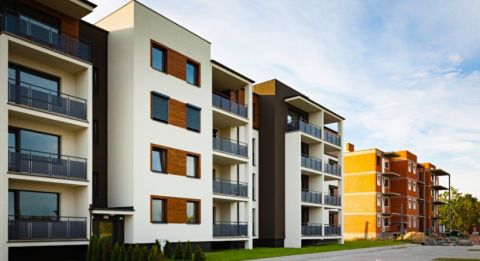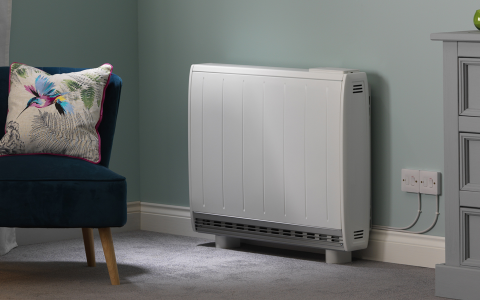Buying guide
Portable Heaters
Portable heaters are ideal for providing extra warmth in specific rooms that may not be adequately heated by the central heating system. For example, they can quickly heat up living rooms, bedrooms, or home offices during colder months.
If an outdated heating system is causing a constant need for additional heat, you may want to consider replacing with the latest installed home heating technologies.
Types of Dimplex portable heaters
Electric Radiators
These stylish heaters use a balance of radiant and convected heat to provide optimum comfort and performance. With 2kW and 3kW options to suit a wider range of room sizes.
Explore portable radiatorsFan and Ceramic Heaters
Fan and ceramic heaters are perfect for top-up heating with instantaneous heat up and easy portability, giving you a flexible heat source whenever you need it.
Explore portable fansConvector heaters
Convectors are ultra lightweight and ideal for top up or back up heating. Available in 2kW and 3kW, these heaters are ideal for providing heat to large spaces and larger rooms. As convectors work by heating up the air, they are more effective in insulated rooms.
explore portable convectorsBenefits of portable heating
Targeted Heating
Homeowners may prefer portable heaters to focus heat on one area, like when sitting on the sofa, working at a desk, or relaxing in bed, without the need to heat the entire room.
Flexibility and Portability
Lightweight and easy to move, Dimplex portable heaters can be used wherever additional heat is required, providing rapid warmth exactly where needed.
Quick and Convenient
Portable heaters heat up quickly, making them ideal for situations where homeowners need warmth in a short amount of time, such as early mornings, late evenings, or after returning to a cold home.
Room-Specific Needs
Portable heaters, like oil heaters, electric fan heaters, or plug-in electric heaters, are useful in rooms with unique needs, such as bathrooms requiring quick heat or nurseries where consistent warmth is important.
Considerations for heating specific places
Radiant heat
Radiant heaters work by emitting infrared radiation to heat the objects and people in their direct line of sight, similar to how the sun warms the earth. This method of heating is ideal for providing immediate warmth to a specific area. They are perfect for spot heating, such as warming up a chair, desk, or reading nook.
Convection heat
Convection heaters work by heating the air in the room. These heaters warm the air at the bottom and let it rise, allowing for an even distribution of heat throughout the space. They are ideal for providing consistent warmth in enclosed rooms or areas where even heat distribution is important, such as living rooms and bedrooms.
Fan heat
Fan heaters use a fan to pass cooler air through a heating element and then blow warm air into the room. This allows the heater to quickly circulate the warm air, providing rapid heat throughout a space. Fan heaters are great for smaller rooms or areas where you need a quick boost of heat, such as a bathroom or office.
Some rooms may require a specific type of heater for a range of factors. For areas like garages or workshops, durability is also a factor that needs to be considered. Fans like Dimplex RUG3TS fan heater are designed with durability in mind with a sturdy outer casing, protecting it from tools and equipment accidentally falling on it as well as the elements.
Conservatories or extensions often lack proper insulation and can feel chilly in colder weather, making portable heaters a practical solution to help bolster heating to this room. Portable electric radiators like FutuRad provide a mix of radiant and convection heat for a mix of natural feeling, direct and even heating.
Alternative Heating During System Maintenance
When a home’s central heating system is under repair or maintenance, portable heaters can provide a reliable backup to maintain comfort.
Seasonal Use
In mild autumn or spring weather, it may be more cost effective to not want to run the central heating and instead use portable heaters in this transitional period.
Emergency Heating
In cases of sudden cold weather, power cuts (when compatible with backup generators), or unexpected circumstances, portable heaters offer a convenient solution to stay warm.
Output considerations
2kW heaters
2kW Heater are suitable for smaller rooms, typically up to 20 square meters (approximately 215 square feet) like bedrooms, small home offices, or similarly sized spaces.
3kW Heaters
3kW Heaters are designed for larger areas, effectively heating rooms up to 30 square meters (around 323 square feet) like living rooms, larger offices, or open-plan areas.
Insulation Considerations
A well-insulated rooms a retain heat more effectively which could potentially allow a 2kW heater to suffice even in moderately larger spaces.
Poorly insulated rooms will have higher heat loss, which may mean opting for a 3kW heater is necessary to maintain a comfortable temperature, even in smaller rooms.
Additional Factors
Standard calculations often assume a ceiling height of 2.4 meters (approximately 8 feet). Rooms with higher ceilings may require a more powerful heater due to increased volume.
Colder climates or rooms with significant exposure to external elements might benefit from a higher-capacity heater to achieve desired warmth.
Energy Efficiency Tips
Selecting a heater that matches your room's requirements ensures efficient energy use. An undersized heater will struggle to heat the space, while an oversized one may consume unnecessary energy.
In larger or poorly insulated rooms, consider using additional heating solutions or improving insulation to enhance overall efficiency.
Control options
When selecting a portable heater, the right control features can make all the difference in achieving more convenient comfort, energy efficiency, and ease of use. Portable heaters equipped with these advanced control features offer greater flexibility and energy savings.
Remote Control
Heaters with remote control functionality allow you to adjust settings without leaving the comfort of your seat.
12-Hour Timer Modes
12-hour timers allow you to program your heater to turn on or off at specific times, helping you save energy and enjoy heat only when it’s needed.
LED Screens
Clear screens provide an easy-to-read display of the heater’s current temperature, timer, and heating mode.
Boost Function
The boost function provides an instant burst of heat when you need it most, ideal for early mornings or unexpected temperature drops.
Adjustable Thermostat
An adjustable thermostat gives you precise control over your desired room temperature. The heater automatically switches on or off to maintain the set temperature, ensuring comfort while saving energy.
Frost Protection
Frost protection is a useful feature for areas prone to extremely low temperatures, such as garages, conservatories, or utility rooms. This mode prevents the temperature from dropping too low by automatically activating the heater when the room nears freezing.
Cold Setting
Many modern portable heaters come with a cold setting that allows the unit to circulate cool air during warmer months. This dual functionality can be used all year-round.
Oil-Filled Portable Radiators vs. Oil-Free Portable Radiators
Which Is Right for You?
When it comes to portable heating solutions, oil-filled and oil-free radiators are two popular options. Each type has its own set of benefits depending on your heating needs and space. Understanding the differences between them can help you make the best choice for your home or office.
Oil-Free Portable Radiators
Oil-free electric radiators use advanced heating elements without the need for oil. Instead, they rely on electric coils or other technology to generate heat. These models heat up quickly, providing on demand top up warmth to take the chill out of a room. In a smaller or temporary space, an oil-free radiator is more efficient, offering immediate warmth with a lighter and more compact design.
Pros:
Oil-free radiators typically heat up faster, delivering warmth almost immediately when turned on.
These radiators are generally smaller and lighter, making them easier to move from room to room.
With a slimmer design, oil-free radiators fit into smaller spaces, giving more flexibility for storage when not in use.
Cons:
Unlike oil-filled radiators, oil-free models don’t retain heat for as long after being turned off, so they may need to be left on for extended periods to maintain warmth.
Some oil-free models may use fans to distribute heat, which could create a slight amount of noise during operation.
Oil-Filled Portable Radiators
Oil-filled radiators work by heating oil inside the radiator, which in turn warms the metal body of the heater and radiates heat into the room. These radiators are a great choice, particularly in spaces where you need steady heat over a longer period Once heated, the oil retains its warmth, allowing the radiator to continue emitting heat after it has been turned off.
Pros:
Because the oil is the primary heat source, oil-filled radiators operate quietly without any noisy fans.
The oil-filled heat source combines radiant and convection heat that doesn’t dry out the air, making them ideal for long-term use.
Due to the oil's thermal properties, these heaters can retain heat and use less energy to maintain warmth once it’s been generated, making them a more energy efficient electric heat source.
Cons:
Oil-filled radiators take longer to heat up since the oil needs time to warm before it starts radiating heat. If you need immediate heat, oil-filled radiators may not be the best option due to their slower response times.
These models tend to be heavier compared to oil-free versions, making them less convenient to move around.
Both types of portable radiators are excellent solutions for home and office heating. At Dimplex, we offer a variety of models for both options, ensuring you can find the perfect solution for your specific needs.
By registering with Dimplex, you can easily access product support, receive important updates, and take advantage of extended warranties and service information.
Register a ProductDimplex heaters are equipped with essential safety features to provide you with peace of mind while keeping your space warm.
electrical safetyAccess a range of helpful resources, including product manuals, FAQs, and expert advice, to help you get the most from your Dimplex products.
Customer support hub
What are the changes to Part L implemented in June 2022?
The updates to parts of Building Regulations that deal with energy performance in Scotland and Wales are being introduced to support the net-zero trajectories in both devolved nations.

Glen Dimplex responds to new Building Regulation Approved Documents
This week saw the long-awaited publication of the English Building Regulations. Having contributed to the workshops and consultations that led to these new Approved Documents, we were pleased to see much of the industry feedback cited appears to have been incorporated, particularly in the case of flexibility when replacing traditional fossil fuel systems.

Debunking the misconceptions of electric panel heating
Modern, energy efficient electric panel heaters that offer a high level of control to users, whilst using low carbon energy, are unrecognisable from the inefficient, clunky panel heaters of the past. Despite technological advances, the perception of electric heating mostly relates to the old technology that grew in popularity with the advent of cheaper nuclear energy in the late 1950s. Traditionally, panel heaters in homes were accompanied by storage heating to make use of the energy generated ‘off-peak’ and assist with under-utilised night-time energy available on the grid. In addition, electric heating has long been a convenient form of secondary heating, for example with the use of portable fan heaters.











